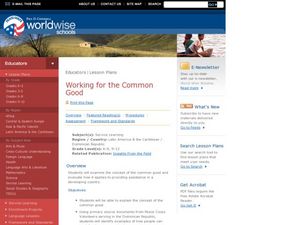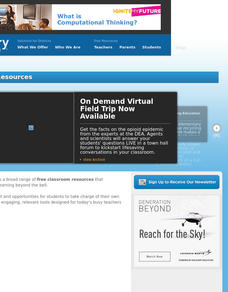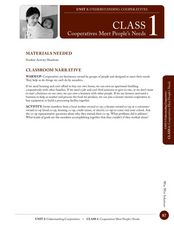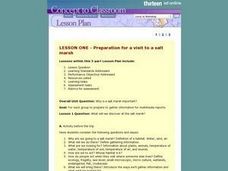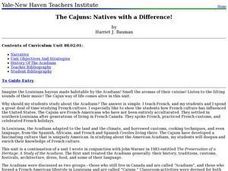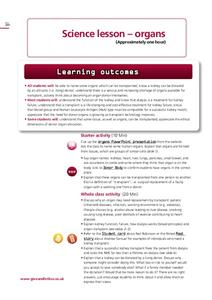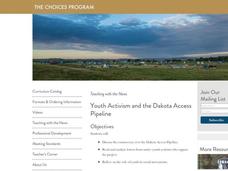Smithsonian Institution
Two Perspectives on the Battle of Little Bighorn/Greasy Grass
Learners understand why historians conduct research and the importance of perception when it comes to studying history. The resource covers The Wars of Expansion and the Battle of Little Bighorn/Greasy Grass through group work, debate,...
Curated OER
Town Growth and Immigration
Fourth graders describe how Michigan has changed and stayed the same over time. They explain reasons why people settled/settle in Michigan, then explain the role of geography on the settlement of Michigan.
Curated OER
Lesson 3 : Important People and Places In Our Community
Students discuss important people and places in their community. In this community lesson plan, students brainstorm together and create a web that shows the important places and people. They choose one important place to draw and write...
Curated OER
Jobs
Students review newspaper want ads and note information about wages and salaries. They identify the jobs, wages, salaries and fringe benefits from the ads. Students explain why people work for others and the importance of wages,...
Curated OER
Famous People
Students discuss character and character traits that people admire and do not admire. They research people who have made significant contributions to society using the Internet, encyclopedia and library to determine characteristics...
Curated OER
PEOPLE OF THE STONE AGE
Sixth graders summarize how early people interacted to meet basic human needs. They observe how increased numbers of people and the search for food led to migration. Students analyze how the interactions among people led to the...
Curated OER
Working for the Common Good
Students discuss the concept of the common good. Using primary source documents, they read accounts from volunteers in the Dominican Republic and discuss how they work for the common good. They reflect on the topic in their journals to...
Curated OER
Silly School vs. Super School
Young scholars explore the importance of classroom jobs. They observe a puppet who is irresponsible and never gets her work completed and then discuss whether or not this puppet should be given a classroom job. As a class, they examine...
Macmillan Education
Changing Your Mindset
Why do some people achieve their goals and persevere despite the setbacks they face? This question is the focus of this life skills lesson, which includes worksheets, discussion, and collaborative activities on developing a growth mindset.
University of the Desert
What Are the Possible Causes of Cultural Misunderstanding?
Why do cultural misunderstandings happen? What causes stereotypes, and what is dangerous about them? After viewing some possible explanations to these questions provided by young adults around the world, your learners will discuss how...
Curated OER
Vital Work
Students consider the role of women in the food industry. In this gender exploitation instructional activity, students work in groups to examine unfair labor practices. Students watch a video and write a fictional letter from a female...
Curated OER
Mind Over Matter: How Does the Brain Work
Students research previous attempts by scientists to discover the ways in which the brain works, design and conduct an experiment to illustrate current research and present their findings to the class.
Curated OER
Cooperatives Meet People's Needs
Students understand what a cooperative is and how it helps people. In this cooperatives lesson plan, students interview a member of a local cooperative and record their responses on a worksheet. Students share and gather their...
Curated OER
Populism and the People’s Party
Students examine the history of the Populist Party as it relates to its reforms and economic plight. In this Populism and the People's Party lesson, students explore why farmers experienced financial difficulty at the end of the century....
Curated OER
People in History- Anne Frank
Students examine discrimination and what it was like during WWII and today. In this writing and analyzing lesson plan, students read pasages from Anne Frank's diary and find connections between Anne's life and the life of people in our...
Curated OER
Why is a salt marsh important?
Middle schoolers discuss the salt marsh. They define the following terms: habitat, water, land and air. Students work in small groups. They are asked why are they going to a salt marsh? Middle schoolers discuss whose habitat is it at...
Curated OER
How government Works
Young scholars read to understand the process of lawmaking. For this lawmaking lesson, students define vocabulary and create an organizer showing the law making process. Young scholars role play the various people involved in the...
Curated OER
The Cajuns: Natives with a Difference!
Students examine the immigrant experiences of various culture groups. Using this information, they work together to compare and contrast these experiences with those of the Cajuns. As a class, they define ethnic group and research the...
Polar Trec
Recess at 25 Below
Is there any difference between the ways a child from the polar region gets ready for recess, and the way a child from a tropical region gets ready for recess? Youngsters use a checklist to dress their Arctic Barbie and Polar Bob dolls...
Curated OER
Work and Rewards
Fifth graders explore the concept of work. Rewards for working are considered and related to personal recognition and satisfaction.
Give and Let Live
Blood and Transplant: Organs
Who donates organs, and how do organ donations work? The third lesson in a four-part series discusses the tremendous need for donor organs of all ages and backgrounds. A variety of materials, included with the teacher's guide, walk...
US Department of Agriculture
Agriculture Counts
Agricultural survey and the documentation of livestock or goods was the basis for the first written language. Youngsters discuss sorting and counting, and how these skills have been used for thousands of years. They accent their class...
PBS
Interviewing: The Art of Asking Questions
Interviewing skills are important, even outside of a news reporter's desk or employer's office. Take your class through the process of interviewing people they don't know with a set of case studies featuring journalists and various...
Brown University
Youth Activism and the Dakota Access Pipeline
Do young people have a role in social movements? Should they? The involvement of young people in the Dakota Access Pipeline is the focus of a resource that asks class members to examine letters written by native youths who oppose the...








